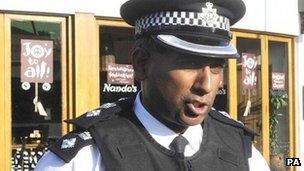Police chief Dal Babu criticises ethnic recruitment
- Published

Ch Supt Dal Babu is retiring from the Met Police after 30 years' service
One of Britain's top ethnic minority police officers has accused chief constables of not understanding the need for more black and Asian recruits.
Ch Supt Dal Babu told BBC News many of his colleagues just "don't get it".
Ch Supt Babu, 49, who retires from the Metropolitan Police on Monday after 30 years' service, said "radical measures" were needed so police had a better understanding of different cultures.
The Met said it had made "good progress" with ethnic recruitment.
Greater Manchester Chief Constable Sir Peter Fahy said the obstacle to greater ethnic minority recruitment was the legal framework - not senior officers.
'Business case'
In spite of targets to boost the number of ethnic minority police officers in England and Wales they remain under-represented at 5% of the workforce.
In the majority of the 43 forces, there are no black or Asian officers at senior levels. Home Office figures show there were only six such officers at the ranks of Assistant, Deputy and Chief Constable in March 2012.
There are also comparatively few black and minority ethnic officers in specialist units, such as CID and firearms.
Ch Supt Babu - who is of Indian heritage and helped found the National Association of Muslim Police - said there was a "business case" as well as "moral" reasons for raising numbers, particularly in specialist units.
He said: "It's about having that cultural understanding when you're planning the firearms operation - do you understand the cultural aspects that might be misinterpreted as being aggression within a particular community?
"Do you understand when communities are praying on a particular day?" adding that having more officers from different backgrounds would also help cut translation costs.
"But ultimately it's the right thing to do," he said.
"We need to make sure that people who join feel confident that they can join different parts of the organisation."
Resistant to change
In 1999, after the Macpherson report into the murder of Stephen Lawrence, the Labour government set police forces targets to boost ethnic minority officer numbers and although some achieved it many have found it difficult.
Ch Supt Babu, who has spent the past three-and-a-half years as commander of the London borough of Harrow, said many chief constables had been resistant to change.
"There's a significant number of people who just don't get it and I think what we need to be doing is making sure that people really understand the importance of diversity in the police service," he said.
"You judge people by what they've delivered. And I'd say, have a look at how many of these chief constables have got senior black and ethnic minority officers. How many of them have got officers in their specialist departments? That would be the ultimate test."
But Sir Peter Fahy, who leads on workforce development for the Association of Chief Police Officers, denied chief constables were to blame, saying they had been left "frustrated" in their attempts to recruit more ethnic minority officers by existing employment law.
Sir Peter said: "We need a wider interpretation of the definition of 'occupational requirement'," adding that currently, if chief constables wanted to recruit officers who had an understanding of a particular national or ethnic group, they had to "dance on a legal pinhead" to do so.
Same old thing
Ch Supt Babu agreed that a fresh approach was needed but said it could be done without new legislation.
"I think we need to be radical. I think we need to be different. Largely what we've ended up doing in the 30 years I've been in the organisation is doing the same old thing.
"It's an advert in the Voice or Asian Times, we do a bit of race awareness training - and that just hasn't delivered results."
He suggested that applicants to the police should be required to have certain languages, spoken in minority communities, or to have done voluntary work, rates of which are thought to be high in ethnic minority groups.
"If we'd looked at those factors we'd be attracting individuals from minority communities," he said.
The Metropolitan Police, which covers the most ethnically diverse part of the country, said it had made "good progress", with 17% of its officer recruits from black and minority ethnic backgrounds.
But the Met said its Commissioner, Sir Bernard Hogan-Howe, had asked for "new proposals" to increase representation in the force as a whole and at senior levels, as it embarked on a drive to recruit thousands more police later this year.
- Published30 January 2013
- Published30 January 2013
- Published5 June 2012
- Published31 May 2012
- Published6 April 2012